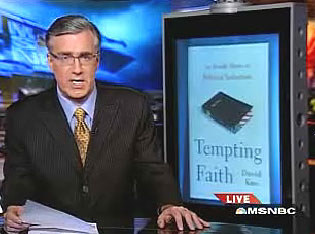 Picking up from earlier revelations--how the Bush Administration duped Christian conservatives--MSNBC's Keith Olbermann broadcast the second installment on, Tempting Faith, David Kuo's new controversial book.
Picking up from earlier revelations--how the Bush Administration duped Christian conservatives--MSNBC's Keith Olbermann broadcast the second installment on, Tempting Faith, David Kuo's new controversial book.
John Amato (Thanks, John!) at Crooks and Liars posted a transcript and video of Olbermann's show.
Reading the MSNBC transcript shows just how the nuts--Karl Rove's term for Christian evangelicals--were exploited (with emphasis added):
...Kuo writes that the Faith-Based Office was so starved for support from the Oval Office that it was forced to transform itself into a political arm of Republican campaign efforts.
David Kuo is himself a self-described conservative Christian. His personal, and his religious assessment of Mr. Bush, is nowhere near the most newsworthy of Kuo's revelations in our report tonight.
[...]
In Kuo's eyes, today's national Christian leaders were being used. They didn't have the same shrewdness Billy Graham had in the '70s, to question whether Nixon was using him for his appeal to religious voters.
In fact, Christians who voted for Mr. Bush based on his religion, may have ended up hurting the very people Jesus sought to help: the poor.
But when Senator Chuck Grassley tried to rewrite Mr. Bush's 1.7 trillion dollar tax cut to include six billion in tax credits for groups helping the poor — tax credits that Mr. Bush himself had publicly proposed — Kuo says Bush's assistant told Grassley to drop the charity tax credits. The White House had no interest.
The cuts Mr. Bush did want made things worse for charities.
Kuo claims that the estate tax cuts discouraged charitable giving, costing charities an estimated 5 billion dollars.
The ultimate impact of Mr. Bush's tax cuts, he says, was to brutalize the very charities Mr. Bush once identified as his top priorities. After only a year, charitable donations were down dramatically, and some charities had shut down.
Kuo says the White House was more concerned with the appearance of doing something.
He says the Faith-Based office wasn't even set up during the 2001 transition until Mr. Bush took office and Karl Rove gave a transition volunteer less than one week to roll out the entire Faith-Based Initiative.
The volunteer asked how he should do that, without staff, without an office, or without even a plan.
According to Kuo, "Rove looked at him, took a deep breath, and said, "I don't know. Just get me a f–ing faith-based thing. Got it?"
After that, it was easier to push faith-based legislation, rather than faith-based funding, because legislation was a cheaper way to show the president was supposedly doing something.
Bush assistant Margaret Spellings, now the Education Secretary, asked Kuo for legislation and said she didn't care what kind, any kind of faith bill would do, he writes.
When the office got a substantive bill – a bill backed by every senator from Santorum to Clinton, the only hold-up was a green light from Josh Bolten or Andy Card.
They didn't get the green light.
What kind of bill did get such a support?
Kuo says the White House liked the issue of religious hiring… not because it was a real issue affecting real charities, but because it was divisive and that made good politics.
"Tempting Faith" also suggests that the Bush White House would use anything for politics.
[...]
...Kuo asked whether Karl Rove still wanted to let Falwell attend the National Service [after his inflammatory remarks about 9/11].
Even while Ground Zero was still burning, politics still mattered.
Rove let Falwell attend, as long as he stayed off-camera. While others wept, Kuo says, Falwell laughed about something with another conservative leader. Spotting Barbara Bush, Falwell remarked on how "frumpy" she looked.
Even choosing the new faith-based director, Jim Towey, was an issue of politics.
Rove put out the word that for Towey to get the job, he had to get as many cardinals as he could to vouch for him.
He did and he got the job.
Kuo freely admits he, too, is no stranger to the politics of conservative compassion. He writes he spent much of the '90s lobbying for it.
But at the time, he says the top Republican donors had no interest in fighting poverty. They had other enemies in mind, and told Kuo they would provide lavish funding if the target was not poverty but instead, the Clintons.
And Kuo would know about this. By the early '90s, he was already a conservative insider, part of Jack Kemp's think tank, "Empower America."
To help bring about the 1994 Republican revolution, Kuo writes that he and his team taught more than 600 candidates how to run for office: By blaming President Clinton for the nation's sad state of affairs at the time. Kuo writes they tried to ignore the fact that Clinton had only just started in office after 12 years of [the] administrations of Reagan and Bush.
Together with fellow Christian Mike Gerson-now Bush's top speechwriter-Kuo writes he wrote political speeches to appeal to religious audiences, even when the speakers did not want to give those speeches.
Jack Kemp removed religious "values" language from a speech he was to give to the Southern Baptist Convention. So, instead, Gerson and Kuo snuck in a few phrases that evangelicals would recognize, but lay people would not. Kuo calls it a “code” that would continue to be used in speeches over the years by politicians including John Ashcroft, Ralph Reed, Bob Dole… and George W. Bush.
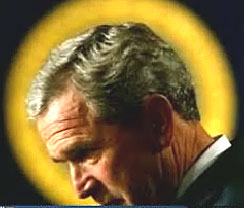 The "Jesus is my savior" lipservice Republicans provide may give evangelicals comfort as a thar one of us-ins tribal identifier. Sadly, the denial that such rhetoric is a fake promise uttered by rapacious con men hurts evangelicals.
The "Jesus is my savior" lipservice Republicans provide may give evangelicals comfort as a thar one of us-ins tribal identifier. Sadly, the denial that such rhetoric is a fake promise uttered by rapacious con men hurts evangelicals.
The tragic irony in Kuo's account is that millions of Christian evangelicals live middle class lives, some with low incomes, struggling with finances and debt, dealing with parenting issues, education, health care, and other domestic concerns. Their challenges can lead them to feel "persecuted." Too often they look for a scapegoat and blame the wrong foe; enemies their peers and leaders tell them are their persecutors. Cunningly without a speck of morality and sometimes maliciously, Republicans, realizing how evangelicals believe the devil is the source of the pitfalls and misfortunes in life, have aimed the blame with help from the popes of propaganda like a cannon at a political and social target. The secularists, the liberals, the Clintons, the Democrats, and anyone akin to homosexuals, feminists, and abortionists is code word, Satan. And the neocon's popes who intermingle politics and religion in branding themselves the chosen leaders of social conservatives, complied with the GOP strategy and got rich, powerful, and famous, too, in the process. A convenient alliance, no? You can hear in Falwell's words from the Olbermann or Crooks and Liars video clip who he condemned as the enemy among us behind the 9/11 attacks:
I really believe that the pagans, and the abortionists, and the feminists and the gays and the lesbians, all of them who tried to secularize America... I point the finger in their face and say, you helped this happen.
Don't think for one minute that Jerry Falwell, Pat Robertson, or Tony Perkins don't know what they're doing. They have an ideological agenda, some with political aspirations, and they aim to win their personally ambitious crusade by any means possible. They will play the outraged dupes if the truth penetrates the public awareness of their collusion, conscious or unconscious, in step with the Republican strategy to use the Christian flock like indentured servant voters.
In the end, GOP leaders and the popes of propaganda inadvertently, if not intentionally in the case of the smirking executioner from Texas, increased the suffering of millions of middle-class evangelicals economically, legally, educationally, and medically. Some believers pay the ultimate price in an unnecessary war.
Self-aggrandizing calculation is the primary brain function in Kuo's story married with the impulse of sadistic callous hearts who marched America into record-breaking debt, a culture of corruption, and armed conflict. There's nothing Jesus-like in any of these accomplishments.
Christian evangelicals need to get over the idea that if thar not like us-ins, thar agin us. That's hogwash, the same magically thinking that asserts marriages across America will suddenly dissolve into fairy dust if gays and lesbians can marry. What's that say about their gullibility?![]() Digg this story
Digg this story

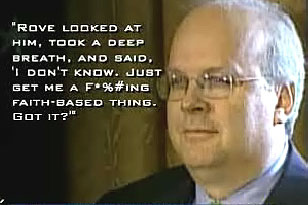







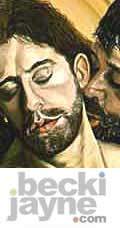

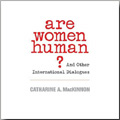
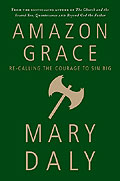
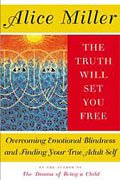


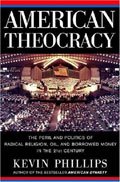







|